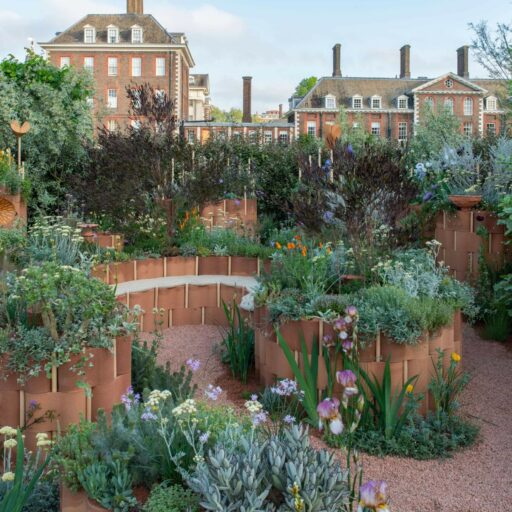The UK set a renewables record, breast cancer research had a breakthrough, and those wrongfully convicted in a major scandal got justice, plus more good news
This week’s good news roundup

A top international court said this week that states are legally obliged to curb greenhouse gases to protect the marine environment, a move hailed as a landmark moment.
In a session in Hamburg, Germany, the International Tribunal for the Law of the Sea said that planet-warming gases absorbed by the ocean count as marine pollution, and added that wealthy countries were duty-bound to cut emissions faster than developing ones.
It’s the first time an international court has issued such a statement, and is a growing sign that courts will play an increasingly important role in helping drive down emissions.
Meanwhile in South Korea, final arguments were heard in a historic case involving more than 200 claimants taking the government to task over climate inaction. They include 60 children who allege their fundamental rights to life, happiness and freedom have been violated.
Jiyoun Yoo of Amnesty International Korea, which is supporting the claimants, said: “The climate crisis is already upon us, but its effects will be felt most intensely by future generations. Cases like this are crucial to safeguarding citizens’ rights in the face of this existential threat.”
A ruling in the case, which Amnesty says could set a human rights precedent, is expected later this year.
Image: Joel Vodell

It was the UK’s number one source of electricity for 28 years running, but gas’ carbon-belching reign is finally over. For the first time, wind has provided the bulk of the country’s electricity over an entire year.
Data compiled by Imperial College London showed that over the last 12 months, wind generated 32% of the UK’s electricity, compared to 31% for gas.
Blustery weather and massive new offshore wind farms, including Dogger Bank A in the North Sea, gave wind the competitive edge. Also eating into gas’ share of the energy mix was imported wind power from Denmark – transported via a new undersea cable – and imported nuclear power from France.
“The UK’s transition from gas to wind has gone beyond the tipping point,” Dan McGrail, chief executive of industry body RenewableUK, told The Times. “We’re now living in a world where clean power dominates our electricity system.”
Image: Kohei Hara/iStock

Scientists have found a way of keeping human breast tissue viable outside the body for at least a week – a development described as a “breakthrough”.
Culturing tissue samples by preserving them in a special gel solution means that different drugs and hormones can be tested on live tissue to see how they interact with cells, helping speed up the development of new drugs.
“Breast cancer mortality is decreasing in the UK thanks to improved screening and treatment options, but incidences continue to rise and breast cancer is the most commonly diagnosed cancer in the UK,” said Lester Barr, consultant breast surgeon and founder of the charity Prevent Breast Cancer.
“It’s therefore really important that we develop new prevention and risk reduction options for women, especially for those with a high risk due to their family history or genetics.”
He added: “This breakthrough means that researchers will be able to test new drugs in the lab with far greater accuracy. It’s a hugely exciting development in animal-free research which puts us in a really strong place to find new drugs to prevent breast cancer.”
The research was funded by Prevent Breast Cancer and led by the University of Manchester, England.
Image: Julia Koblitz

Radiography departments in England are to get £15.5m of algorithmic assistance from new AI tech which can pinpoint cancer cells 2.5 times faster than doctors alone.
The ‘game-changing’ package will roll out across NHS England in a matter of weeks, according to a government statement published on Tuesday.
The technology works by automatically reviewing CT or MRI scans, helping medics rapidly distinguish between cancerous cells and healthy tissue, and avoiding healthy organs suffering damage during radiation treatment.
“This is an exciting breakthrough in our work to improve cancer diagnosis and treatment, and AI is helping to make our healthcare system faster, simpler and fairer,” said health and social care secretary Victoria Atkins.
Image: National Cancer Institute

Victims of one of the biggest miscarriages of justice in British legal history are finally set to have their convictions quashed.
A long-running scandal saw more than 700 sub-postmasters wrongly accused of theft due to an IT fault. Some were forced to pay back money they hadn’t taken; others went to prison. Four took their own lives.
A law quashing their convictions was finally approved by Parliament on Thursday – one of its last acts before being dissolved ahead of the election. It applies to England, Wales and Northern Ireland – the Scottish parliament is to pass its own bill to quash convictions.
Lee Williamson, a former sub-postmaster in Northern Ireland, told the BBC that he was “overjoyed”. Those who were wrongfully convicted will be entitled to compensation.
Related: Life after: A wrongful conviction
Image: Elliot

The UK’s postal service has stepped up a gear in efforts to decarbonise its fleet of HGVs: in the last year it has spared the planet from around 30,000 tonnes of CO2 by swapping diesel for 10m litres of biofuel at six of its largest sites.
The measure is part of Royal Mail’s Steps to Zero environment strategy, which is gunning for net zero by 2040.
It began using hydrotreated vegetable oil in June 2023. The biofuel cuts carbon emissions by 90% compared to diesel, and Royal Mail is complementing the move by switching out fossil fuel vans for electric vehicles.
“It’s of critical importance to our customers that we do everything we can to reduce our emissions as soon as possible,” said Zebrina Hanly, Royal Mail’s head of environment. “Electric and hydrogen options for HGVs are still in their infancy, so while the technology and infrastructure are developing, our strategy is to keep emissions to a minimum by using HVO as a transitional fuel.”
Image: Sun Dawn

A wearable gizmo that zaps spinal nerves with an electrical current brought life-changing improvements to people with paralysis in a pivotal international trial.
Researchers found that pairing standard rehabilitation exercises with the Arc-Ex device helped spinal injury patients regain strength and movement in their hands and arms.
The improvements were described as profound, with 87% of participants reporting a better quality of life.
Arc-Ex – developed by Dutch firm, ONWARD Medical – works by stimulating intact nerves which bridge the injury site. Over half of spinal cord injury patients still have some.
Times journalist Melanie Reid, who has been living with a spinal cord injury for 10 years, trialled the device through Glasgow’s Queen Elizabeth National Spinal Injuries Unit. “Your hands are so intrinsically taken for granted, but they are vital to so many aspects of someone’s quality of life,” she said. “It’s a woman’s right to be able to put her hair up in a scrunchie, and the therapy allowed me to do that.”
The device is expected to be approved for use in the US this year. Europe is set to follow.
Image: Klara Kunova

A nature-inspired alternative to toxic pesticides has shown early promise in trials in the Netherlands.
The innovation relies on a biodegradable ‘insect glue’ made from edible plant oil, which mimics the natural, defensive secretions of some plants. The substance acts like a sprayable fly paper, snaring small pests but leaving larger beneficial insects such as bees unaffected.
In tests on the western flower thrip – which attacks 500 species of vegetable, fruit and ornamental crops – 60% of the bugs were captured within two days of spraying. Work continues to see if the glue can be made more attractive to both pests and their natural predators.
Nick Mole, from Pesticide Action Network UK, said more research was needed to establish the environmental impact. “This is a very interesting piece of research that could result in much-needed decreases in the use of synthetic pesticides,” he said. “Using natural oils to make physical traps for disease-carrying insects could be a sustainable alternative to toxic pesticides.”
Image: Juup Schram

The world’s largest enclosed botanical garden was heated by deep geothermal energy this winter in a first for the UK in almost four decades.
The Eden Project in south-west England sunk a 5km-deep well to generate heat for its offices and famous biomes. It’s the UK’s first operational deep geothermal well since 1986, and should take the Eden Project almost entirely off gas, while saving 500 tonnes of CO2 a year.
The attraction’s new nursery will also benefit from geothermal heat, enabling its horticulture team to propagate and take care of one million plants per year.
“We are working with and for nature to develop new ways to grow and new ways to encourage people to think differently about plants, the planet and themselves,” said the Eden Project’s chief transformation officer, Si Bellamy.
Image: Eden Project

Activists who hope to reverse the decline of a treasured British waterway have unveiled their own four-step manifesto in response to a widely criticised action plan announced last month by the UK government.
The River Wye, which flows 155 miles (250km) from Wales, through England, to the Severn estuary, has been devastated by nutrient run-off linked to intensive chicken farming.
The UK government said last month it would fund on-farm poultry manure combusters to the tune of £35m, pilot anaerobic digestion plants and provide more grants for slurry stores to process the mountains of waste and help restore the river to health.
However, grassroots groups say the ideas lack scope and ambition, and this week unveiled their own Manifesto for the Wye at the annual Hay festival.
They want a ‘water protection zone’ to protect the Wye from farm waste and sewage, a recovery fund to back nature-positive agriculture, and better enforcement to ensure polluters pay. Fairer supermarket pricing which rewards river-friendly farmers is also in the plan.
David Gillam, from campaign group Save The Wye, said: “We know what needs to be done and our manifesto represents the people’s plan for the Wye, created in response to all the evidence we’ve gathered over the last few years.”
Image: Manifesto for the Wye

A display that is thought to be the most biodiverse in the show’s history, and a garden built with 3D printed bricks wowed the judges at the Chelsea Flower Show, the highlight of the British horticultural calendar.
The Size of Wales garden took home a coveted gold medal and featured 313 species of plants, a nod to the number of tree species that can be found in a single hectare of rainforest. It was sponsored by climate change charity Size of Wales, which works with Indigenous people worldwide to protect tropical forests.
Meanwhile Chelsea first-timer Giulio Giorgi won the show’s inaugural green medal for environmental innovation by using 100% sustainable materials, including timber and 3D printed terracotta. He also eschewed power tools in the build process to further reduce the carbon footprint of his creation (pictured).
Malcolm Anderson, RHS head of sustainability, said this year’s show had seen a ‘seismic shift’ in the way gardens had been built and designed. “We can always do better and there is always something new to learn,” he said. “We should all take a moment to celebrate the sustainability stories embedded in this year’s gardens.”
Image: Nicola Stocken
Main image: Eden Project Living Landscape team Annalice Line and Sofia Parra at Growing Point 2. Eden Project
Get your weekly fix of good news delivered to your inbox every Saturday, by signing up to the Positive News email newsletter.
Be part of the solution
Positive News is helping more people than ever to get a balanced and uplifting view of the world. While doom and gloom dominates other news outlets, our solutions journalism exists to support your wellbeing and empower you to make a difference towards a better future.
But our reporting has a cost and, as an independent, not-for-profit media organisation, we rely on the financial backing of our readers. If you value what we do and can afford to, please get behind our team with a regular or one-off contribution.
Give once from just £1, or join 1,400+ others who contribute an average of £3 or more per month. You’ll be directly funding the production and sharing of our stories – helping our solutions journalism to benefit many more people.
Join our community today, and together, we’ll change the news for good.





